How To Make a VPN Undetectable & Bypass Blocks in 2026
- How Can I Make a VPN Undetectable?
- How To Bypass VPN Blocks — Proven Ways To Make Your VPN Undetectable
- Quick Comparison Table: Best Undetectable VPNs
- Our Methodology for Testing Undetectable VPN Technology
- What Is VPN Blocking, and Why Do VPNs Get Blocked?
- Types of VPN Blocks
- How Can I Tell if a Site Has Detected VPN Use?
- FAQs on Bypassing VPN Blocks
There are several ways to hide VPN use, avoiding those annoying "proxy detected" errors, and securely stream from anywhere, as well as access the internet without restrictions. I've run into the same roadblocks — most recently, I tested a VPN, and the WiFi at work immediately flagged my connection.
I also noticed that a music news site I frequently visit started blocking VPNs. Apparently, the site was targeted due to harassment by trolls and bot farms using VPNs to evade detection. I understand why websites do this, but I should still be able to read my news with an encrypted connection (I need to stay safe from internet pests, too). So, my team and I've put together the best methods to make VPNs undetectable, drawing on our collective years of testing hundreds of VPNs.
Is it easy to make a VPN undetectable? Getting around VPN blocks can be challenging, as websites, streaming platforms, ISPs, and governments are constantly improving the tools they use to spot VPN traffic. It’s believed that around 46% of Americans use VPNs (Exploding Topics, 2025)1, and it’s even estimated that 1.75 billion people use VPNs worldwide (Surfshark, 2025)2. So, in this guide, I share proven solutions to help you find and use the right VPN features and setup, making your VPN much harder to detect.
How Can I Make a VPN Undetectable?
- Choose the right VPN.
The most important step is to pick a VPN that can actually bypass internet restrictions. Most VPNs don’t actually offer features that can hide them from restrictive networks. - Install the VPN and set up obfuscation.
Activating this feature hides VPN use. Some VPNs come with it automatically set up, while others require you to switch to a “stealth” or obfuscated protocol. - Start browsing undetected.
Now you can use the internet as you usually would with an encrypted connection that shouldn’t get flagged or blocked.
Short on Time? Here Are the Best Ways To Make a VPN Undetectable in 2026
| Pros | Cons | Difficulty Level | |
| Pick the right VPN | Most VPNs can’t avoid detection, making this the most critical step. | You may already have a VPN, and don't want to pay for a new one. | Finding the right VPN to avoid detection isn't easy, but I've listed the ones that worked best in our tests. |
| Activate obfuscation | This feature helps get around deep packet inspection, which is the best way to detect VPNs. | Some VPNs don’t offer this feature on every server, so you might not be able to use it for a specific country IP address. | This one’s easy, as some VPNs activate this automatically while most let you engage it with one click. |
| Switch protocols | Quality VPNs offer several protocols you can switch between to troubleshoot VPN blocking issues. | This option may require more trial and error as you test different protocols. | All you have to do is switch between a few settings, so it’s generally quite simple. |
| Connect to a dedicated IP | When you’re the only one using an IP address, it’s less likely to get flagged. | Nearly all VPNs charge an extra fee per month for this feature. | Dedicated IPs require more setup, as each VPN has slightly different instructions on how to activate them. |
| Change servers often | Moving between servers makes it harder to get an IP blocklisted. | This can interrupt your connection and any online activities you’re busy with. | While not difficult, this can be a hassle; however, some VPNs rotate their IPs automatically. |
| Try multihop or double VPN servers | Multihop connects you to 2 servers (or a server + a proxy), and more encryption means it’s harder to detect VPN use. | Double VPN will almost always significantly lower your speeds. | Some VPNs have preset double VPN options, but others let you pick your own entry and exit nodes, which takes a little more time. |
How To Bypass VPN Blocks — Proven Ways To Make Your VPN Undetectable
You're not the only one wondering how to stop your VPN from being detected — Over 50% of VPN users want to avoid blocks (Windscribe, 2025)3. I've been there too, running into sites and apps that instantly flag my connection and lock me out when I'm using a VPN — I'm referring to you, Bank of America. You can try one or even combine a few methods below to make your VPN usage stay under the radar.
1. Choose a Secure and Reliable VPN
The best thing you can do is pick the right VPN because most can’t hide from detection. For example, the majority of free VPNs don’t have obfuscation technology, or their servers are so overused that all their IPs are quickly blocked. There are a few free VPNs I love that I recommend to friends who are just starting with the technology. But it’s a sad fact that they’re simply easier to detect.
I get it, you might already be subscribed to a VPN you like, or you've paid for one and don't want to switch. That's totally fine. The good news is, there are still plenty of tricks you can try with the VPN you already have. Check out the steps below to see which features your provider supports and how you can use them to stay undetected.
2. Use Obfuscation
Obfuscation is the technology or feature that VPNs use to make their traffic look like regular internet traffic. VPNs accomplish this by adding additional encryption, utilizing different ports, scrambling data packets, and other methods. With some VPNs, the obfuscation feature is automatic. With others, you’ll have to use specific servers or protocols to activate it.
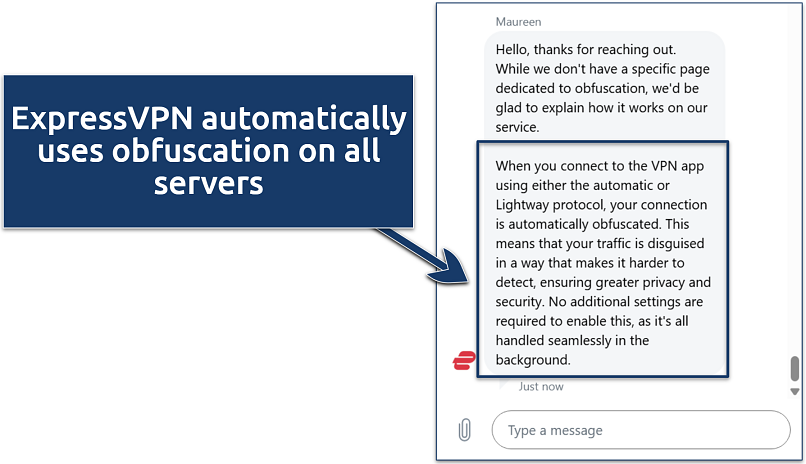 Note that obfuscation does not work if you switch to OpenVPN
Note that obfuscation does not work if you switch to OpenVPN
3. Change VPN Protocols
With many VPNs, you’ll need to use a specific protocol to access obfuscation. For example, ExpressVPN is automatically set to Lightway, its own proprietary protocol that offers obfuscation. Many VPNs also use the word “stealth” interchangeably with the term obfuscation. Still others use their own terms (Surfshark calls its obfuscation Camouflage Mode, for example).
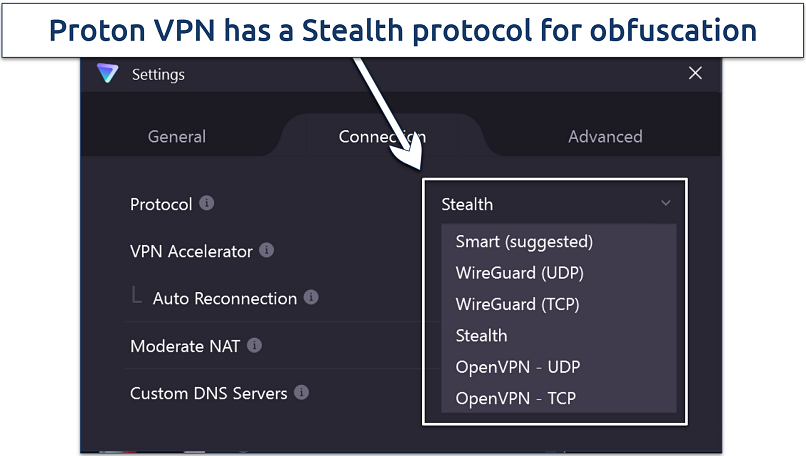 Most VPNs allow you to switch between several protocols in their settings tab
Most VPNs allow you to switch between several protocols in their settings tab
4. Use a Dedicated IP
A dedicated IP can make a VPN harder to block because you don’t have to worry about other users' actions. IPs are frequently blocked when many people use them (like I mentioned with free servers). I also love that dedicated IPs let me avoid CAPTCHA, and I can use them with my banking app without getting flagged. The only downside is that they usually cost a little extra per month.
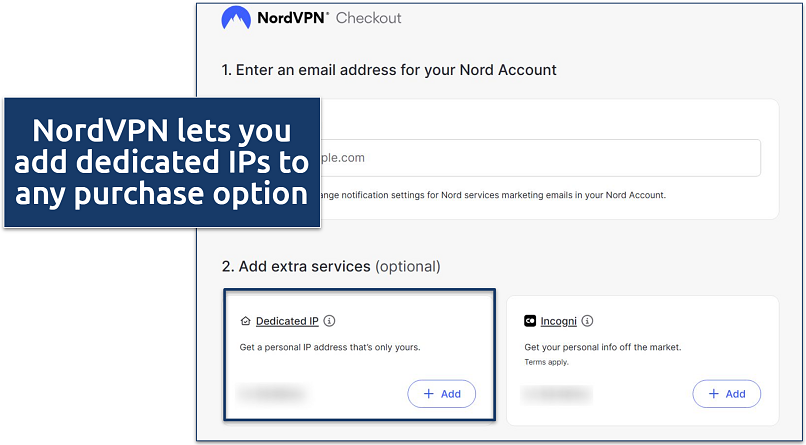 The VPN will provide further instructions on how to connect in the app
The VPN will provide further instructions on how to connect in the app
5. Frequently Rotate Servers
Switching servers can hide a VPN since some IPs get flagged. Unfortunately, IPs can get blocked with even the best options. I’ve been testing VPNs for years, and I’ve seen blocked IPs with all the top providers. Thankfully, the best VPNs frequently rotate their IPs, so blocks are less frequent. You should also know that many VPNs switch IPs each time you disconnect and reconnect to a given location (so you don’t always have to pick a new city/country).
This is a good method if the goal is to make a VPN undetectable on a restricted network, such as those found in schools. School networks are often slow, but this shouldn’t significantly impact your speeds, unlike the next option.
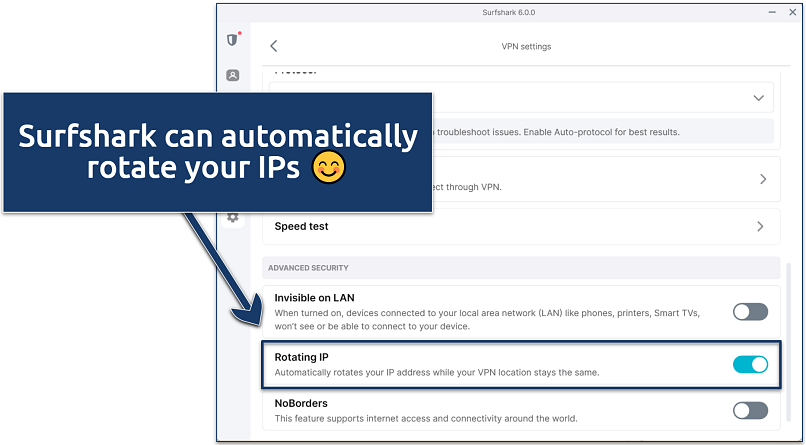 It switches the IP address every 5-10 minutes
It switches the IP address every 5-10 minutes
6. Use Multihop or Double VPN Servers
Double VPN (also known as multihop) encrypts your connection twice, so it’s harder to detect VPN use. This feature sends your traffic through 2 different servers for double the protection. Some VPNs have preset double VPN servers, while others let you pick which servers you want to use.
However, sending your traffic through 2 locations often lowers speeds significantly. I’m a bit of a speed freak when it comes to my internet connections, so I only use this as a last resort. But, depending on your network, drastic measures like this might be necessary. Speaking of speeds, you can find the fastest VPNs here. Most of them come with strong obfuscation and multihop features.
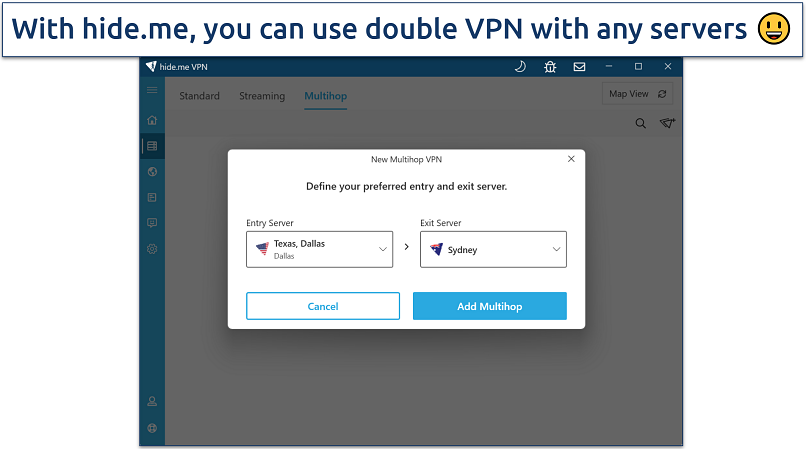 Try to choose 2 nearby locations to diminish speed loss
Try to choose 2 nearby locations to diminish speed loss
7. Try Switching Ports
You can change the port in your VPN settings (usually in the protocol section) to make your VPN less detectable. You can think of a port as the “gateway” your VPN uses to transmit data. Port 443 is the main gateway used by HTTPS traffic (utilized by most websites), so it’s generally the hardest to detect. I recommend starting with that one if it’s available.
There’s also a common VPN feature called port forwarding that you may have heard of. I like to use it while I’m torrenting because it can increase seeding and downloading speeds. However, it often leaves your data more exposed, making it a poor choice for hiding VPN use.
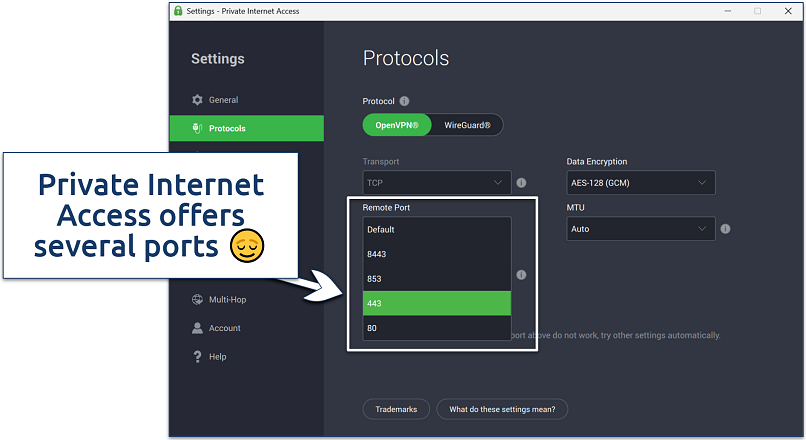 PIA only lets you switch ports with the OpenVPN protocol
PIA only lets you switch ports with the OpenVPN protocol
8. Use a VPN Along With Tor
Using a VPN along with Tor can make it harder to detect, since Tor adds several more layers of encryption. You’ll have to make sure you find a VPN that’s compatible with Tor, and be aware that this will lower your speeds even more than most multihop setups. You’ll also need to install a browser for Tor, and be careful because I’ve seen some shady sites that offer fake, malware-ridden installation files. With that said, torproject.org is a safe site to download the onion browser.
Some networks or countries might restrict the dark web. This is understandable since illegal activities do take place there. But many people advocate for its continued presence, especially for journalists who need to expose the truth no matter where they are. With that said, my team and I don’t condone any illegal activities. Look up your local regulations before choosing to access Tor, and please never use it to break the law.
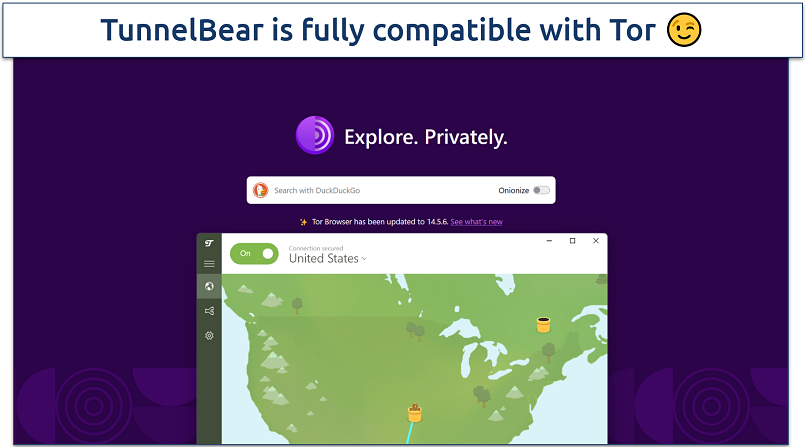 I recommend connecting to the VPN before launching Tor
I recommend connecting to the VPN before launching Tor
Quick Comparison Table: Best Undetectable VPNs
I've put this table together to help you quickly size up the best VPNs to avoid detection. In addition to the listed features, each VPN consistently ranks highly in our regular speed tests. They’re also capable of securely accessing dozens of the most popular streaming platforms from anywhere. Finally, they’re all consistently effective on restrictive school, business, and government networks.
Our Methodology for Testing Undetectable VPN Technology
We ran in-depth tests to find out which VPNs can really stay undetectable — and what features they use to pull it off. For example, we tried blocking various VPNs on our own routers to see if they could slip through, and we also tested them on public networks to check how well they stayed hidden.
Additionally, my team and I conducted leak and detection tests with over 30 top VPNs, cycling through different ports, protocols, and servers, to see which ones truly hold up when it counts. The top undetectable VPNs are inevitably better for secure use in countries with strict censorship and surveillance. The best VPNs also reliably work with top streaming platforms.
What Is VPN Blocking, and Why Do VPNs Get Blocked?
I've run into VPN blocks on various sites and networks, and the reasons behind them typically fall into a few categories. Some websites block VPNs outright to protect themselves, for example, to cut down on trolling and abuse. Other sites block VPNs because they don’t want people accessing their content from certain regions due to copyright agreements.
Many governments block VPN use to censor the internet. Restrictive countries only want their version of the internet to be accessed, and they know that VPNs make it possible to see anything available on the World Wide Web. Finally, many schools, public WiFi networks, and businesses try to prevent people from using VPNs because they don’t want to be held liable for how the VPNs are used.
Types of VPN Blocks
There are several ways networks block VPNs, and I’ll outline the most effective methods to bypass these blocks.
| Description | Solution | |
| IP-based blocking | This is the simplest way to block a VPN. Once it’s suspected that a VPN is using an IP, it’s completely blocked. | Switching IP addresses is one way to avoid this. It’s also helpful to use an IP rotator feature to switch IPs every few minutes automatically.
A dedicated IP address is less likely to be blocked since only one person utilizes it. |
| IP allowlisting | Also called whitelisting. Instead of blocking specific addresses, the network only allows connections from certain ISPs. | The best way to avoid this is by using a VPN with strong obfuscation, leak detection, and a wide variety of servers (and dedicated IPs don’t hurt). |
| Port-based blocking | Specific ports are more commonly used by VPNs, allowing networks and sites to block them and prevent VPN use. | Many VPNs’ obfuscation features automatically pick ports that are less likely to be blocked. If you have the option, consider switching to Port 443, as it’s the least likely to be banned. |
| Deep packet inspection (DPI) | Data packets can be analyzed to find specific signatures that are common to VPNs. | This is where obfuscation is important. It switches up those signatures so that they’re nearly indistinguishable from regular internet traffic. |
How Can I Tell if a Site Has Detected VPN Use?
It’s not always easy to tell if a site has detected VPN use, but here are a few clues:
- Error message. This is the most apparent sign that VPN use has been detected. It’s usually found on websites. For example, a streaming site may have a page that asks a user to disconnect from their VPN. Other times, the error is more general. However, if there’s no error message when the VPN is disconnected, you’ll have a good idea that it’s been detected.
- Unable to access the site. Instead of an error message, the site may just appear unavailable when the VPN is connected. Sometimes this doesn’t necessarily happen because the VPN is being detected; it could be because the VPN isn’t working properly. Trying to connect to 2 VPNs at once or using a server that’s being repaired can block the internet entirely. If the internet is working correctly with the VPN connected, it may be necessary to troubleshoot the issue using methods to make the VPN undetectable.
- Slower speeds or higher latency. This problem is rare, but some sites deprioritize VPN traffic. They slow down these connections to discourage VPN use. If the site seems much slower than it should be with the VPN connected, you may be getting throttled.
FAQs on Bypassing VPN Blocks
References
- https://explodingtopics.com/blog/vpn-stats
- https://surfshark.com/blog/vpn-users
- https://windscribe.com/blog/vpn-statistics-trends/
Your online activity may be visible to the sites you visit
Your IP Address:
216.73.216.136
Your Location:
US, Ohio, Columbus
Your Internet Provider:
Some sites might use these details for advertising, analytics, or tracking your online preferences.
To protect your data from the websites you visit, one of the most effective steps is to hide your IP address, which can reveal your location, identity, and browsing habits. Using a virtual private network (VPN) masks your real IP by routing your internet traffic through a secure server, making it appear as though you're browsing from a different location. A VPN also encrypts your connection, keeping your data safe from surveillance and unauthorized access.
I’m in Bangkok; used Express VPN while hailing Grap ride and accessing my CC apps.
Suddenly, all CC’s got turned off due to fraud triggers!! I was told that VPN usage, when detected, triggers fraudulent activity warnings to credit cards; especially when traveling ouside the USA.
So, no, Express VPN is not the best and failed. So, I’m now shit out of luck and have turn on my US cell line to call all credit cards and get them unblocked.
Thank you for sharing your experience.
It’s true that some financial institutions flag VPN usage as a potential security risk, especially when transactions appear to come from different locations in a short period of time. This isn't specific to ExpressVPN but rather a general security measure used by banks and credit card companies to prevent fraud.
To avoid this in the future, you may consider:
- Using a dedicated IP address (some VPNs offer this feature to reduce the chances of triggering fraud alerts).
- Disabling the VPN when making financial transactions to avoid detection by banking security systems.
- Informing your bank before traveling so they don’t flag transactions from unexpected locations.
We understand how frustrating this situation is, and we appreciate your feedback. If you need assistance with VPN settings to prevent similar issues in the future, feel free to ask!
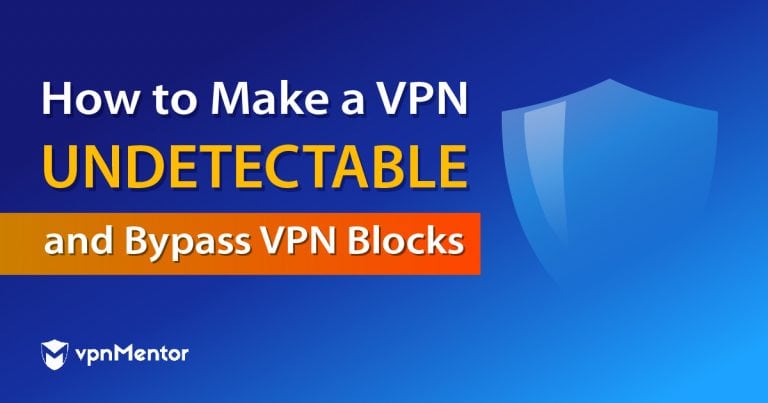



Please, comment on how to improve this article. Your feedback matters!